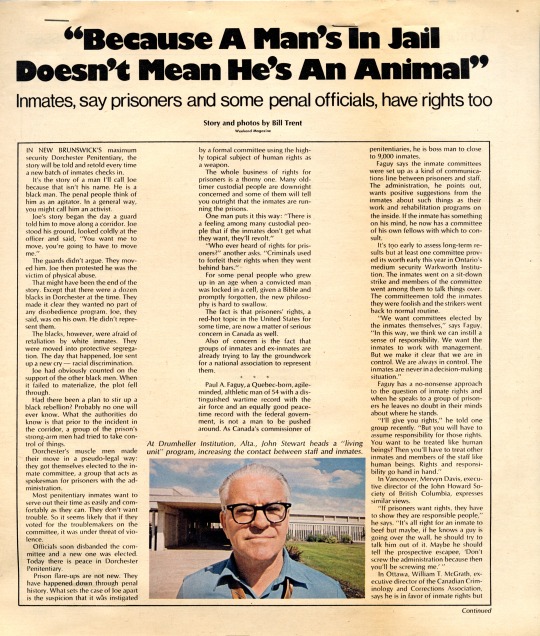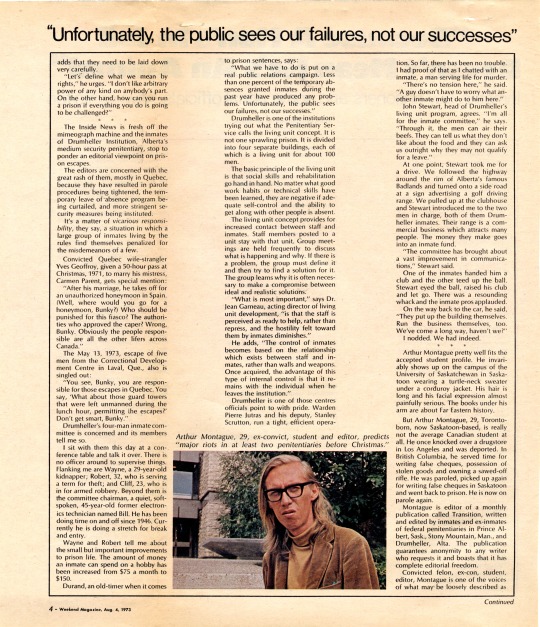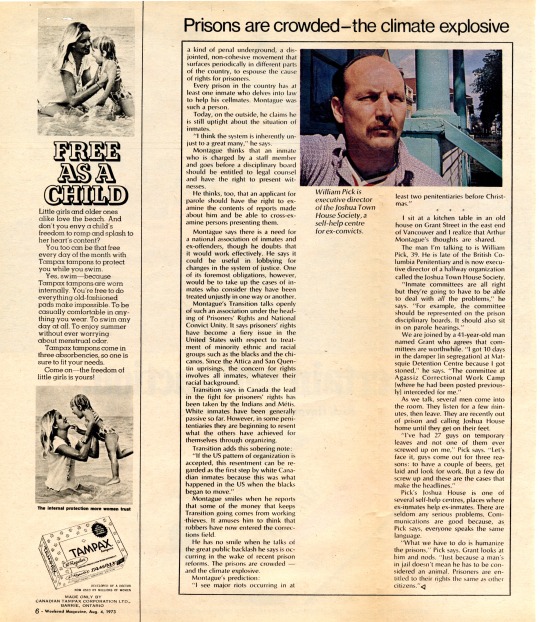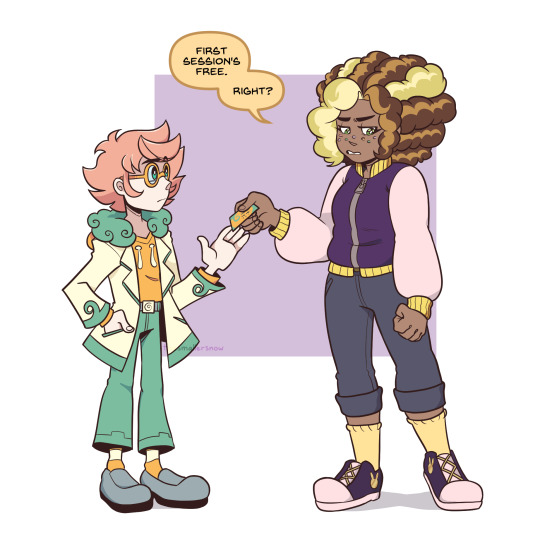#prisoner protests
Explore tagged Tumblr posts
Text



""Because A Man's In Jail Doesn't Mean He's An Animal"," Weekend Magazine. August 4, 1973. Page 3, 4, 6. ---- Inmates, say prisoners and some penal officials, have rights too ---- Story and photos by Bill Trent, Weekend Magazine --- IN NEW BRUNSWICK'S maximum security Dorchester Penitentiary, the story will be told and retold every time a new batch of inmates checks in.
It's the story of a man I'll call Joe because that isn't his name. He is a black man. The penal people think of him as an agitator. In a general way, you might call him an activist.
Joe's story began the day a guard told him to move along a corridor. Joe stood his ground, looked coldly at the officer and said, "You want me to move, you're going to have to move me."
The guards didn't argue. They moved him. Joe then protested he was the victim of physical abuse.
That might have been the end of the story. Except that there were a dozen blacks in Dorchester at the time. They made it clear they wanted no part of any disobedience program. Joe, they said, was on his own. He didn't represent them.
The blacks, however, were afraid of retaliation by white inmates. They were moved into protective segregation. The day that happened, Joe sent up a new cry racial discrimination.
Joe had obviously counted on the support of the other black men. When it failed to materialize, the plot fell through.
Had there been a plan to stir up a black rebellion? Probably no one will ever know. What the authorities do know is that prior to the incident in the corridor, a group of the prison's strong-arm men had tried to take control of things.
Dorchester's muscle men made their move in a pseudo-legal way: they got themselves elected to the inmate committee, a group that acts as spokesman for prisoners with the administration.
Most penitentiary inmates want to serve out their time as easily and comfortably as they can. They don't want trouble. So it seems likely that if they voted for the troublemakers on the committee, it was under threat of violence.
Officials soon disbanded the committee and a new one was elected. Today there is peace in Dorchester Penitentiary.
Prison flare-ups are not new. They have happened down through penal history. What sets the case of Joe apart is the suspicion that it was instigated by a formal committee using the highly topical subject of human rights as a weapon.
The whole business of rights for prisoners is a thorny one. Many old- timer custodial people are downright concerned and some of them will tell you outright that the inmates are running the prisons.
One man puts it this way: "There is a feeling among many custodial people that if the inmates don't get what they want, they'll revolt."
"Who ever heard of rights for prisoners?" another asks. "Criminals used to forfeit their rights when they went behind bars."
For some penal people who grew up in an age when a convicted man was locked in a cell, given a Bible and promptly forgotten, the new philosophy is hard to swallow.
The fact is that prisoners' rights, a red-hot topic in the United States for some time, are now a matter of serious concern in Canada as well.
Also of concern is the fact that groups of inmates and ex-inmates are already trying trying to lay the groundwork for a national association to them represent them.
///
Paul A. Faguy, a Quebec-born, agile-minded, athletic man of 54 with a distinguished wartime record with the air force and an equally good peace-time record with the federal government, is not a man to be pushed around. As Canada's commissioner of penitentiaries, he is boss man to close. to 9,000 inmates.
Faguy says the inmate committees were set up as a kind of communications line between prisoners and staff. The administration, he points out, wants positive suggestions from the inmates about such things as their work and rehabilitation programs on the inside. If the inmate has something on his mind, he now has a committee of his own fellows with which to consult.
It's too early to assess long-term results but at least one committee proved its worth early this year in Ontario's medium security Warkworth Institution. The inmates went on a sit-down strike and members of the committee went among them to talk things over. The committeemen told the inmates they were foolish and the strikers went back to normal routine.
"We want committees elected by the inmates themselves," says Faguy "In this way, we think we can instill a sense of responsibility. We want the inmates to work with management. But we make it clear that we are in control. We are always in control. The inmates are never in a decision-making situation.
Faguy has a no-nonsense approach to the question of inmate rights and when he speaks. to a a group gr of prisoners he leaves no doubt in their minds about where he stands.
"I'll give you rights," he told one group recently. "But you will have to assume responsibility for those rights. You want to be treated like human. beings? Then you'll have to treat other inmates and members of the staff like human beings. Rights and responsibility go hand in hand."
In Vancouver, Mervyn Davis, executive director of the John Howard Society of British Columbia, expresses similar views.
"If prisoners want rights, they have to show they are responsible people," he says. "It's all right for an inmate to beef but maybe, if he knows a guy is going over the wall, he should try to talk him out of it. Maybe he should tell the prospective escapee, 'Don't screw the administration because then you'll be screwing me."
In Ottawa, William T. McGrath, executive director of the Canadian Criminology and Corrections Association, says he is in favor of inmate rights but he adds that they need to be laid down very carefully.
"Let's define what we mean by rights," he urges. "I don't like arbitrary power of any kind on anybody's part. On the other hand, how can you run a prison if everything you do is going to be challenged?"
///
The Inside News is fresh off the mimeograph machine and the inmates of Drumheller Institution, Alberta's medium security penitentiary, stop to ponder an editorial viewpoint on pris on escapes
The editors are concerned with the great rash of them, mostly in Quebec, because they have resulted in parole procedures being tightened, the temporary leave of absence program being curtailed, and more stringent security measures being instituted.
It's a matter of vicarious responsibility, they say, a situation in which a large group of inmates living by the rules find themselves penalized for the misdemeanors of a few.
Convicted Quebec wife-strangler Yves Geoffroy, given a 50-hour pass at Christmas, 1971, to marry his mistress, Carmen Parent, gets special mention:
"After his marriage, he takes off for an unauthorized honeymoon in Spain. (Well, where would you go for a honeymoon, Bunky?) Who should be punished for this fiasco? The authorities who approved the caper? Wrong. Bunky. Obviously the people responsible are all the other lifers across Canada."
The May 13, 1973, escape of five men from the Correctional Development Centre in Laval, Que, also is singled out:
"You see, Bunky, you are responsible for those escapes in Quebec. You say, 'What about those guard towers that were left unmanned during the lunch hour, permitting the escapes?" Don't get smart, Bunky."
Drumheller's four-man inmate committee is concerned and its members tell me so. I sit with them this day at a conference table and talk it over. There is no officer around to supervise things. Flanking me are Wayne, a 29-year-old
kidnapper, Robert, 32, who is serving term for theft, and Cliff, 23, who is in for armed robbery. Beyond them is the committee chairman, a quiet, soft- spoken, 45-year-old former electronics technician named Bill. He has been doing time on and off since 1946. Currently he is doing a stretch for break and entry.
Wayne and Robert tell me about the small but important improvements to prison life. The amount of money an inmate can spend on a hobby has been increased from $75 a month to $150.
Durand, an old-timer when it comes to prison sentences, says: "What we have to do is put on a real public relations campaign. Less than one percent of the temporary absences granted inmates during the past year have produced any problems. Unfortunately, the public sees our failures, not our successes."
Drumheller is one of the institutions trying out what the Penitentiary Service calls the living unit concept. It is not one sprawling prison. It is divided into four separate buildings, each of which is a living unit for about 100 men.
The basic principle of the living unit is that social skills and rehabilitation. go hand in hand. No matter what good work habits or technical skills have been learned, they are negative if adequate self-control and the ability to get along with other people is absent. The living unit concept provides for increased contact between staff and. inmates. Staff members posted to a unit stay with that unit. Group meetings are held frequently to discuss what is happening and why. If there is a problem, the group must define it and then try to find a solution for it. The group learns why it is often necessary to make a compromise between ideal and realistic solutions.
"What is most important," says Dr. Jean Garneau, acting director of living unit development, "is that the staff is perceived as ready to help, rather than repress, and the hostility felt toward them by inmates diminishes."
He adds, "The control of inmates becomes based on the relationship which exists between staff and inmates, rather than walls and weapons. Once acquired, the advantage of this type of internal control is that it remains with the individual when he leaves the institution."
Drumheller is one of those centres officials point to with pride. Warden Pierre Jutras and his deputy, Stanley Scrutton, run a tight, efficient operation. So far, there has been no trouble. I had proof of that as I chatted with an inmate, a man serving life for murder.
"There's no tension here," he said.
"A guy doesn't have to worry what another inmate might do to him here." John Stewart, head of Drumheller's living unit program, agrees. "I'm all for the inmate committee," he says. "Through it, the men can air their beefs. They can tell us what they don't like about the food and they can ask us outright why they may not qualify for a leave."
At one point, Stewart took me for a drive. We followed the highway around the rim of Alberta's famous Badlands and turned onto a side road at a sign advertising a golf driving range. We pulled up at the clubhouse and Stewart introduced me to the two men in charge, both of them Drumheller inmates. Their range is a commercial business which attracts many people. The money they make goes into an inmate fund.
"The committee has brought about a vast improvement in communications," Stewart said.
One of the inmates handed him club and the other teed up the ball. Stewart eyed the ball, raised his club and let go. There was a resounding whack and the inmate pros applauded. On the way back to the car, he said, "They put up the building themselves. Run the business themselves, too. We've come a long way, haven't we?"
I nodded. We had indeed.
Arthur Montague pretty well fits the accepted student profile. He invariably shows up on the campus of the University of Saskatchewan in Saskatoon wearing a turtle-neck sweater under a corduroy jacket. His hair is long and his facial expression almost painfully serious. The books under his arm are about Far Eastern history.
But Arthur Montague, 29, Toronto-born, now Saskatoon-based, is really not the average Canadian student at all. He once knocked over a drugstore in Los Angeles and was deported. In British Columbia, he served time for writing false cheques, possession of stolen goods and owning a sawed-off rifle. He was paroled, picked up again for writing false cheques in Saskatoon. and went back to prison. He is now on parole again.
Montague is editor of a monthly publication called Transition, written and edited by inmates and ex-inmates of federal penitentiaries in Prince Albert, Sask., Stony Mountain, Man., and Drumheller, Alta. The publication guarantees anonymity to any writer who requests it and boasts that it has complete editorial freedom.
Convicted felon, ex-con, student. editor, Montague is one of the voices of what may be loosely described as a kind of penal underground, a disjointed, non-cohesive movement that surfaces periodically in different parts of the country, to espouse the cause of rights for prisoners
Every prison in the country has at least one inmate who delves into law to help his cellmates. Montague was such a person.
Today, on the outside, he claims he is still uptight about the situation of inmates.
"I think the system is inherently unjust to a great many," he says, Montague thinks that an inmate who is charged by a staff member and goes before a disciplinary board should be entitled to legal counsel and have the right to present witnesses.
He thinks, too, that an applicant for parole should have the right to examine the contents of reports made about him and be able to cross-examine persons presenting them.
Montague says there is a need for a national association of inmates and ex-offenders, though he doubts that it would work effectively. He says it could be useful in lobbying for changes in the system of justice. One of its foremost obligations, however, would be to take up the cases of inmates who consider they have been treated unjustly in one way or another.
Montague's Transition talks openly of such an association under the heading of Prisoners' Rights and National Convict Unity. It says prisoners' rights have become a fiery issue in the United States with respect to treatment of minority ethnic and racial groups such as the blacks and the chicanos. Since the Attica and San Quentin uprisings, the concern for rights involves all inmates, whatever their racial background.
Transition says in Canada the lead in the fight for prisoners' rights has been taken by the Indians and Métis, White inmates have been generally passive so far. However, in some penitentiaries they are beginning to resent what the others have achieved for themselves through organizing.
Transition adds this sobering note: "If the US pattern of organization is accepted, this resentment can be regarded as the first step by white Canadian inmates because this was what happened in the US when the blacks began to move."
Montague smiles when he reports that some of the money that keeps Transition going comes from working thieves. It amuses him to think that robbers have now entered the corrections field.
He has no smile when he talks of the great public backlash he says is occurring in the wake of recent prison reforms. The prisons are crowded and the climate explosive. Montague's prediction:
"I see major riots occurring in at least two penitentiaries before Christmas."
I sit at a kitchen table in an old house on Grant Street in the east end of Vancouver and I realize that Arthur Montague's thoughts are shared.
The man I'm talking to is William Pick, 39. He is late of the British Columbia Penitentiary and is now executive director of a halfway organization called the Joshua Town House Society.
"Inmate committees are all right but they're going to have to be able to deal with all the problems," he says. "For example, the committee should be represented on the prison disciplinary boards. It should also sit in on parole hearings."
We are joined by a 41-year-old man named Grant who agrees that committees are worthwhile. "I got 10 days in the damper [in segregation] at Matsqui Detention Centre because I got stoned," he says. "The committee at Agassiz Correctional Work Camp (where he had been posted previously) interceded for me."
As we talk, several men come into the room. They listen for a few minutes, then leave. They are recently out of prison and calling Joshua House home until they get on their feet.
"I've had 27 guys on temporary leaves and not one of them ever screwed up on me." Pick says. "Let's face it, guys come out for three reasons: to have a couple of beers, get laid and look for work. But a few do screw up and these are the cases that make the headlines."
Pick's Joshua House is one of several self-help centres, places where ex-inmates help ex-inmates. There are seldom any serious problems. Communications are good because, as Pick says, everyone speaks the same language.
"What we have to do is humanize the prisons," Pick says. Grant looks at him and nods. "Just because a man's in jail doesn't mean he has to be considered an animal. Prisoners are entitled to their rights the same as other citizens."
Photos:
Page 3: At Drumheller Institution, Alta., John Stewart heads a "living unit" program, increasing the contact between staff and inmates,
Page 4: Arthur Montague, 29, ex-convict, student and editor, predicts "major riots in at least two penitentiaries before Christmas."
Page 6: William Pick is executive director of the Joshua Town House Society, a self-help centre for ex-convicts.
#life inside#prisoner rights#penal reform#inmate committee#prisoner organizing#prisoner protests#words from the inside#ex-convicts#drumheller institution#british columbia penitentiary#dorchester penitentiary#riot in cell block canada#canadian penitentiary service#saskatoon#vancouver#prison democracy#crime and punishment in canada#history of crime and punishment in canada
5 notes
·
View notes
Text
Sometimes I wish we would start calling out the performative radicalism on this site for the poser bullshit it is. "Remember, it's always morally correct to kill a cop!" "Don't forget to firebomb your local government office!" "Wow, it sure would be a shame if these instructions on how to make a molotov cocktail got spread around!"
Okay. But you're not killing cops or firebombing government offices. You are posting on a dying microblogging website to a carefully-curated echo chamber that has radicalized itself into thinking that taking the absolute most extreme position on any subject is praxis but that anyone discussing the most practical way to effect actual change is your sworn enemy. You do not have the street cred OR the activist cred to be talking about killing cops, babe.
#thinking about the person i saw saying that if you're at a protest#and other protesters try to stop you from becoming violent you should just kill them bc 'peace police are still police'#even taken as hyperbole that's simply dumb as shit on every conceivable level#it's also pretty blatantly hypocritical coming from people who are usually self-avowed prison/death penalty abolitionists#like i'm sorry but you don't get to be a death penalty abolitionist and also call for the death of your political enemies online#this isn't a major issue or anything i'm just bored and annoyed
65K notes
·
View notes
Text

An Iranian motorist rides his motorbike past a mural depicting a scene from the torture of Iraqi prisoners by U.S. personnel at the Abu Ghraib prison near Baghdad, on a major highway in the Iranian capital Tehran, June 1, 2004.
(Photo credit: Behrouz Mehri/AFP)
824 notes
·
View notes
Text
Something people kinda don’t get about the way activism has changed over time is that people can’t really get arrested like they used to. I talk to old activists and they are like “oh yeah, I got arrested like 30 times that year”. Nowadays, you’d be left there to rot after like the third arrest, and that’s if you are really privileged! For a lot of folks, it’s the first arrest. But even just a lot of more “normal” old people got arrested a lot at some point in their youth and let out.
Sentencing and everything has gotten so hard on folks that you just can’t really take the risks you could then. And social services are so weak that there’s nothing to fall back on. Many of the panthers and folks were on welfare, and now you ain’t gonna get a welfare check at all.
So when you look at the movements of the sixties and try to mirror their tactics and their ferver and wonder why folks don’t show up and things don’t go down the same, just consider that these things are really different now. And what you do might got to be pretty different too.
#anarchy#activism#rose baker#anarchism#socialism#organizing#protests#welfare#arrests#prison#abolition
952 notes
·
View notes
Text

Nigeria’s economic crisis deepens: Children facing death penalty for protesting cost of living
By Maggie Vascassenno
In Nigeria, 29 children aged 14 to 17 could face the death penalty after being arraigned in Abuja on Nov. 1 with 76 others for participating in protests against the country’s severe cost-of-living crisis.
The children were charged with multiple felonies, including treason and public disturbance, despite Nigeria’s Child Rights Act, which prohibits criminal proceedings against children or sentencing them to death. Bail was set at an impossible 10 million naira ($5,900) per defendant; some have endured 90 days in detention without adequate food.
Four children collapsed in court from exhaustion. They should be freed and allowed to unite with their families.
Nigeria, one of Africa’s top oil producers, continues to struggle with extreme poverty, rampant corruption, and high inflation. A significant portion of its 210 million people face food insecurity, and the inflation rate is at a 28-year high. Meanwhile, the government has implemented austerity measures at the behest of the World Bank, which is dominated by the U.S.
#Nigeria#imperialism#austerity#World Bank#StopWarOnChildren#youth#students#protest#solidarity#political prisoners#death penalty#Struggle La Lucha
276 notes
·
View notes
Text
if you havent heard of claudia and karina i'm happy to let you know

#claudiakarina2024#debate#biden vs trump#regardless how you feel about voting as a whole#claudia was released from prison recently after protesting for palestine#she is on the ground and putting her face out there and has made herself a target. give a listen to what they are saying
383 notes
·
View notes
Text
"But the protests! We cant be violent, my optics!"
Shut the fuck up. These protests are actively keeping ICE agents in that area incapable of efficiently completely their job. Their job to kidnap people, torture them, and send them to a camp in another country with 0 due process.
Every time protesters stop ICE from advancing. Everytime they force the national guard, the police, whatever the state wants to throw from accompanying ICE, a family is saved. Every single time precincts are forced to stop a crowd instead of assist ICE, a family is saved.
This is direct action. This is showing up and building community. This is organizing.
Also don't give the "Oh but theyre looting!" Yeah and? Fuck those businesses. Looting is redistributing capital back to the working class and still helps stop ICE and Police from acting.
#ICE#Fuck ICE#abolish prisons#abolish borders#abolish ICE#Leftisim#leftist#communist#communism#anarchist#anarchism#socialist#socialism#us politics#la riots#protest#ice out of la
64 notes
·
View notes
Text

visit from a blyndeff sister ( the other one )
#scribbles#epithet erased#prison of plastic#lorelai blyndeff#sylvester ashling#hey gotta make it count!#though if she did do that she'd scream internally seeing the therapist in front of her is a KID#(despite sylvie's vehement protests about it.)#they are both kids it's just that lorelai sees him and think “ ah that's a BRAT ”
973 notes
·
View notes
Text
Vastly different than my normal content, but I really need some help. I'll be running medical in D.C. for a week in order to assist during the 24/7 sit in. An even that is scheduled to continue until 47 gets his grubby ass hands out of office.
Medical supplies are far from cheap, so I made this flier, as well as a linktree and the event poster for what I will be attending.


Even throwing 5$ my way will cover a box of non stick gauze, and if you can't spare that either, I totally get that as well but you can still help by sharing and spreading the word,
PLEASE REBLOG!
#activism#activist#protest safety#protest#direct action#8647#impeach trump#impeach him#donald trump#gofundme#donations#mutual aid#us politics#politics#kamala harris#charity#united states#washington dc#antifascist#anarchism#anarchopunk#lgbt#trans rights#cecot#cecot prison#liberals#tumblr#breaking news
39 notes
·
View notes
Text
Omfg.
"T-Mellon Events is looking for seat fillers and extras to provide their time for space maximization and attendance perception for an event taking place in Washington DC on June 14th. Extras are required to wear Red, White and Blue clothing and will be provided a RED hat to wear. We encourage people of color and ethnic groups to sign up for maximum perception control and these individuals will be prominently displayed on the televised broadcast and local viewing screens."
[Emphasis added.]
Fight Fight Fight is is a company co-owned by CIC Digital LLC, which is affiliated with Trump. It's also involved in the development of the Trump cryptocurrency.
Snopes doesn't know whether the ad was real,
but this is not the first time it's been suspected.
#us stuff#usa stuff#usa news#us politics#no kings#mytomatoes#social justice#donald trump for prison#never trump#traitor trump#trump administration#fuck trump#june 14#protest
37 notes
·
View notes
Text

What Would John Brown Do?

We know exactly what John Brown would do, and should do likewise. Prison-slavery is wrong, forced disappearance is wrong, mass deportation is wrong, denial of due process and habeas corpus is wrong. Redress for these grievances and others must be sought down every possible avenue.

#john brown#resurrect john brown and give him a battle-mech#mech suit#antifascist#fuck ice#forced disappearance#community defense#effective protest#christofascists#trump regime#due process#tyranny#dictatorship#authoritarianism#mass deportations#concentration camps#they're building ghettos#they're tryna build a prison#2nd ammendment#antifascist militia action#no pasaran#palantir#soap box#data mining#data privacy
37 notes
·
View notes
Text


Palestinian protestors flying their national flag (L) and the Venezuelan flag (R), in honour of the death of Venezuelan president Hugo Chavez, are seen during clashes with israeli soldiers outside Ofer prison, near Ramallah, following a demonstration in support of Palestinian prisoners on hunger strike in Israeli jails on March 6, 2013.
(Photo: Abbas Momani)
138 notes
·
View notes
Text


Today in New York City
#Mahmoud Khalil#political prisoners#Gaza Solidarity Encampment#deportation#FreePalestine#GazaGenocide#Melt ICE#protest#NYC#solidarity#Columbia University#students#repression#Donald Trump
226 notes
·
View notes
Text
THE PRISONER OF BEAUTY: HAHA WDYM THIS IS ONLY EPISODE 9 (OF 36) AND NOW I NEED TO WAIT
For a while now, I’ve been steering clear of two things: 1) historical dramas 2) Cdramas.
Why, you ask?
Well, I just don’t like historicals. I find them slow, full of flowery dialogue and mostly too unrealistic. And Cdramas? I always thought they were a little too phony, a little too low-quality, and just not my thing. That’s just what I believed.
DON’T COME AT ME.
Actually, wait. You can come at me. Because I’ve just eaten my own words in the most dramatic way possible.
Because I am now officially obsessed with The Prisoner of Beauty.

This drama is exciting, funny, breathtakingly shot, and makes my heart race. The female lead? ICONIC. Xiao Qiao, the Lady of Wei, is clever and cunning but still feels human. She doesn’t magically outwit everyone in the room with Sherlock-level trickery. She underestimates people. She makes mistakes. But she’s observant, quick, and terrifyingly adaptable. I’m in awe of her. She calculates and recalculates like she’s playing 4D chess in silk robes.
And the male lead? He’s about to become the himbo of my dreams. Not because he’s dumb (he’s not), but because it’s so obvious he is highly susceptible to the charms and schemes of his wife. One minute he’s yelling at her, furious, mistrusting, full of wounded pride (THE LADY DOTH PROTESTS TOO MUCH), the next minute he’s looking at her like he’s two seconds away from handing over his sword, kingdom, and soul. Wei Shao, just LET GO. Give the reins to the Lady of Wei and start your simping era. You’ll be so much happier. You’re almost there, already proposing with A FUCKING LYNX OMG😭
BUT HERE’S THE THING.
I made a critical error.
I committed too early.
I thought, “Hey, I’ll just check this out, maybe one episode before bed.”
Now I’m nine episodes deep, fully deranged, waiting daily like a fool, and caught myself googling “best historical C-dramas 2024” like I haven’t spent the last five years avoiding this exact genre.
I am doomed.
Go check this out - and welcome me to my Cdrama era!
#the prisoner of beauty#cdrama#chinese drama#asian drama recs#period drama#historical drama#xiao qiao#zhao jinmai#lady of wei#song weilong#wei shao#lord of wei#zhao jinmai supremacy#wei shao denial king#cdrama characters#they’re not enemies it’s called foreplay#himbo transformation#himbofication#the lady doth protests too much#i came for one episode now i’m googling 40 episode historicals#cdrama gods have humbled me
25 notes
·
View notes
Text
Ekko when he comes back from the arcane dimension and finds out Jinx somehow became the most responsible member of the main cast in the meantime:
#seriously like#vi: cop then alcoholic pit fighter#caitlyn: police brutality into police state true combo#vander: back from the dead as a berserk werewolf#viktor: spreading that arcane corruption shit ekko probably also isn't a fan of#meanwhile Jinx: adopted a kid: stopped bombing people: symbolizes protest: freed innocent prisoners non-lethally#sure she's in mourning now but like she kinda was flourishing#arcane season 2 spoilers#ekko
59 notes
·
View notes
